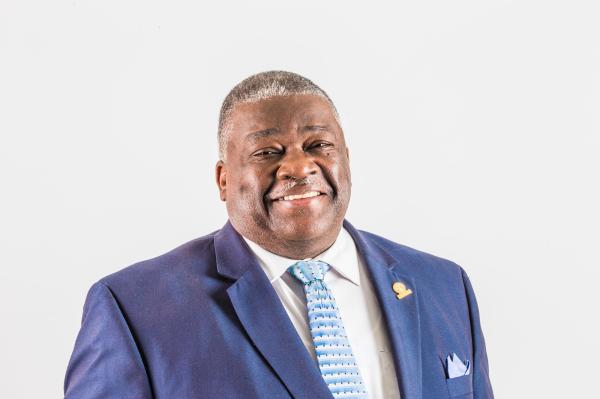Harry Sims (Finally) Responds to A4E Questionnaire

Mayoral candidate and former commissioner Harry Sims has been feuding with Athens for Everyone over the D- grade it gave him, based in part on his failure to fill out the group’s questionnaire. Well, Sims finally filled it out last week.
In it, he gets in a couple of digs at his favorite foil—activists who speak out—as well as opponent Kelly Girtz, and explains his concerns about various policies A4E favors, such as fare-free transit and Complete Streets.
Here are his answers:
One of the things teachers dislike hearing is a student (or their parent) saying they think their grade was unfair. I should know- I spent nearly 30 years in the classroom and while I was fair, I also had elevated expectations for my young students. On the occasion that they did not meet those expectations, I sometimes was told I had given an unfair grade.
I made it my policy to hear the student’s side. Perhaps they misunderstood the assignment or maybe there was something going on at home that was distracting them. Sometimes the student ended up having an even better answer than what I was expecting. In a way, the student was the teacher.
So now I find myself on the other side of this situation. As many of you know, I was given a low grade by A4E that, while not entirely unexpected, was unfortunate because it did not accurately characterize who I am and what I stand for. In such surveys, questions are sometimes asked in a vacuum and the more detailed and sometimes harder reality gets lost. Even the best surveys with the best intentions are challenged to reveal all the aspects of a political issue.
So, the teacher in me has jabbed at my conscious, prodding me to get this missing homework in, even if a little late. I might be a little sullen at my initial grade, but I ask you to consider my perspective in hopes you might be willing to grant a little extra credit.
So here they are- my answers to the Athens for Everyone survey.
Transit Expansion and Fare-Free Ridership
I’m not against transit expansion. Far from it. I chaired the committee that recommended making bus fare free for kids and I voted for it. I’ve advocated for the expansion of routes to Pinewood Estates and down Spring Valley Road.
Here’s what I’m not for: I’m not for taking the fare boxes out of the buses until we have a firm grasp on whether it will disrupt our public transit system. While advocates of fare-free bus service cite the small contribution made by the fare box to the overall buses, they often fail to cite that UGA students pay for transit through fees to the University that the University then pays to the city. If we make transit “free,” we either must still expect university students to pay “their fair share” as noted by one activist or risk our entire public transit altogether. Currently, we have no assurance from the University that they will pay for students to ride the system while all other citizens will ride for free.
It’s government and it’s complicated. Without foresight and agreements in place before we act, we could be endangering the entire system. When my committee proposed fare-free rides for kids, it was only after we measured the economic impact. The impact was low, as was the risk, so it was an easy decision.
These decisions should not have any agreements made until after we’ve considered the unforeseen consequences. I want all the resources our town can provide its citizens but only if those offerings are sustainable, wide reaching and don’t cause an even bigger problem elsewhere.
Complete Streets
The concept of what is a complete street really seems to differ depending on the street in front of your house. For me, I want streets that are mostly free of potholes, don’t flood when it rains and are not so jammed with cars that you cannot see across them. I want this for my neighbors and fellow Athenians as well.
But for others, complete streets mean something else. It appears to mean steering resources to one set of streets while others are blocked, flooded and jammed. I want safe crossings, effective bike lanes, and the ability to get around in or on something other than a car.
I’m wary of seeing sidewalks to nowhere and bike lanes that come to an abrupt end at the bottom of a hill or just before a really dangerous bridge. It is difficult seeing young kids running across Atlanta Highway or Lexington Road- just inches from getting hit.
Like so many issues, our issue is not that we don’t see the problem. Our issue is that we seem to only want to correct the problem in a few places.
I want complete streets; I want a complete city. Access to safe transportation alternatives is a citywide right and I’ll fight for it. But don’t expect me to pick favorites, winners or losers based on who yells the most or has the most. When it comes to safe alternative transportation, we should all be coming from the same side.
Anti-Discrimination
I grew up going to segregated schools. I was the first black varsity athlete at the University of Georgia. For several periods during my time in elected office, I was the only minority on the county commission. The idea that I am not against efforts to stop discrimination is absurd. So, let’s look at the specific vote.
I liked Kelly’s motion to enact an anti-discrimination ordinance. That’s why I voted for it. I did not like Melissa Link’s substitute ordinance because it directed staff to take the opinions of specific people and groups with more seriousness than our overall community. I have been involved in civil rights solutions and fighting discrimination my whole life. I know of many people in this town who have done the same but have had their voices ignored or drowned out by the shouts of others. We should not engage in, nor do I support the engagement of others in, crony activism.
I stand by my vote. Important voices are not always the loudest. I want a broad-based approach and that’s why I voted for it while Kelly abstained from voting on his own motion.
Marijuana Decriminalization
I have said several times that as mayor I would quickly assign this issue to a committee and for good reason. I want to see fewer people’s futures ruined by drugs, but I want to make sure that in the quest to help some, we don’t hurt others even more. For example, a parallel ordinance will get people caught possessing small amounts of marijuana a ticket instead of a trip to jail. However, if that person is caught by campus police, a probation officer or is having a warrant served by a sheriff’s deputy, they are going to jail because these officers all report to the state rather than the local government. Next, if the de-escalation in penalties for possession occurs, will an increase in drug trafficking rise to meet the growing market? What happens to those kids caught selling drugs? They won’t be getting a ticket. This is exactly why I want this issue reviewed by a variety of experts who will live and work with the outcome of their decision.
I’ve stood in court next to kids as they learn how the drug trade has ruined their lives. I’m no stranger to the realities. These kids acted in the moment with little mind to the consequences down the road. Had they spent a little more time thinking, they might have made better choices. I can’t go back and fix it for those kids, but I can try to make sure our city does not make the same mistake.
Housing Policy
Let’s be honest. For the A4E report card, this issue really came down to a single zoning decision. I have worked on the front line of neighborhood revitalization and affordable housing for decades but that fact was not considered by the survey. But let’s put that aside and look at the specific vote.
First, the development on Mitchell Street was never going to be “affordable” housing. If the Selig project taught us anything, it’s that developers are going do what they can economically justify, or they’ll walk away and take their amphitheater and grocery store with them.
The development on Mitchell Street is intended for retired people. This is not family or student housing. And for that reason, not only are the buildings expensive, so is the land underneath them. This means that even if the housing units are priced lower, by law, the property taxes are based on the fair market value. This could mean you would pay as much or more in taxes than you would for a mortgage. Why we would desire to put “affordable” housing on the city’s most expensive land is ridiculous, yet it seems to be the trend. In the past efforts led by some commissioners to make it harder to build affordable housing in areas where the land is actually affordable. This has driven the scarcity of affordable housing for families and has started a dangerous trend of gentrifying the remaining neighborhoods around downtown.
I don’t agree with Mr. Girtz’s recent proposal to use sales taxes to buy down infrastructure charges. Sales taxes and fees are regressive with a disproportionate burden on the poor. The better move is to reverse the efforts Kelly has championed which have driven prices up, gentrified neighborhoods, focused development in town and driven poor families out of their homes.
I voted for Mitchell Street for a few simple reasons. Its high price will likely prevent it from being even more student housing and downtown could use some diversity to its residents. At the same time, the high-end real estate throws off over $700,000 annually in property taxes with over $400,000 of that going to our local schools. That’s money for teachers and students. That’s money to help government budgets provide more services to citizens.
Living Wages
This is one of those issues where there seems to be confusion about what local government can actually do. By law, local government cannot raise the minimum wage as a county. We can control what our government pays its own workers and, while that process has not been error free, the change is a good one.
Kelly’s proposal is certainly worth discussion. He wants to require companies that receive assistance from our local government to pay a living wage. I like the spirit of it, but I question the practicality. For example, does this mean business that relies heavily on tips would no longer get help locating to Athens? Would it simply lead to more unpaid internships? What gaps would it create in the effort to recruit jobs to Athens?
My belief is that if we drive away the businesses that want to be here we’ll only be left with the businesses that have to be here. I don’t want a town simply filled with bars and student housing. I want businesses that choose to be here. Fewer businesses will make that choice if we meet them at the county line with our long list of demands before they even step foot inside.
Early Learning
I spent my entire career in an elementary school classroom. I’ve taught kids and then I’ve taught their kids. Encouraging early learning is not some sort of abstraction for me. I’ve done it. I’ve done it when it was hard. I’ve done it when it hardly paid, and I had to paint houses on the weekend to make ends meet. I did it for three decades.
As I understand it, A4E’s position is to raise taxes to pay for universal early childhood education provided by the government. This sounds very nice. Kids that get help before they enter school typically do better. But I must pause and think of the other side of this. Every time we raise taxes, this may cause another grandmother on a pension to move out of her home because she can no longer afford it. Every time we raise taxes, the dream of home ownership becomes less attainable for those in poverty– Families for whom the home is the source and security of building financial stability fall farther behind. Every time we raise taxes, we owe it to our community and to future generations to ask what else and who else could we be harming in the name of doing what seems to be good.
Finally, we need to ask some hard questions about the active defunding of programs that have shown proven results to affect our kid’s lives for the better. Youth sports and “Grand Slam” changed lives for so many kids in need yet they have seen investment steadily erode. In the case of Grand Slam, the program was discontinued. We must protect these and other vital programs and work to rebuild them, so they can benefit our youth and community for generations to come. Before we set out to create innovative approaches, we must ask why we didn’t remain committed to the ideas and programs that worked in the past.
Plastic Bag Ban
In my house, we put the grocery bags in the bathroom trashcans. They are also good for picking up trash along the neighborhood streets. I’ve been tempted on a few occasions to put a few in my car to hand out to people walking their dogs downtown. There are more than a few uses for plastic bags. Like many things, it’s something that can be used reasonably or otherwise.
How will this ordinance affect the quality of life for most Athenians? What will it mean to the poor who don’t or can’t always carry canvas bags with them to the store? How do we keep this from becoming a burden on those who do the right thing when it comes to using plastic bags?
I don’t have the answers. I’m skeptical of those who say they have all the answers and, for this reason, I will weigh the pros and cons of this and consider what is best for Athens. I want to know the true benefits and the unforeseen consequences. I’m open to the issue but I want to know how it affects our entire county.
The Role of Government
I’ve spent a long time in elected office and it has given me the benefit of understanding what makes a good government work. First, our commission is a majority rule system. This means if you can’t build consensus and get a majority, your idea is going nowhere. Second, our citizens are smart. We use committees to study the issues and give us insight and advice. Government officials are unwise when they try to act unilaterally no matter how good their intentions.
Athens for Everyone is an activist group. I get that. And some commissioners have a record for bending to the will of activist groups. Whether it’s chickens, buffer zones or unaffordable housing, some commissioners have often given a disproportionate share of voice to the activists. I don’t always think that’s a terrible thing. But it is not always a good thing.
Remember, activist groups will come and go but our government must still function. When one activist group wanes, another will fill its place. When that happens for A4E, will you be okay with a government run by the reactionary and politically calculating group of the day? Do you want a government for the protestors and their issues alone or do you want a government that is careful to act, considerate in deliberation and reluctant to choose winners and losers amongst citizens?
In the many years I’ve served this town, I’ve seen activists come and go. They are at the lectern on Monday and moving to Portland on Friday. It’s as if we are the project for their master’s degree and once the degree is in hand they’re off to bigger ponds.
I want something different for you. I hope you’ll stay. I hope you’ll find a good job and a home you love. I hope you’ll have a neighborhood you cherish and join the PTO and enjoy the best that Athens has to offer. I hope you’ll ride your bike, pull your wagons, plant your gardens and help your neighbors with your government helping rather than hampering. I hope you never lose that spirit of an activist.
Because, in my heart, there’s still that young man signing up at the University of Georgia to be a teacher because I knew I could change the world for more than a few kids. There’s still that young city councilman trying to speak up and speak out. There’s still a young man that can feel the sting of prejudice and that pain never really goes away. There’s still work to be done in Athens-Clarke county.
Help me do it. Help us do it. You, your life and everything you want from it are cause enough for me.
As of this writing, A4E has not updated Sims' grade.
Some of these concerns are legitimate. Why would UGA continue to contribute to Athens Transit if its students and employees could ride for free anyway? Others are red herrings. For example, Sims' district has seen several bike and pedestrian infrastructure project built in his district recently, from Firefly Trail to on North Avenue, while the squeaky wheels on Prince Avenue are still waiting for the opportunity to even try a road diet. And some are a tad disingenuous: Grand Slam was discontinued under Sims' watch, and while sales taxes are regressive, Sims never opposed a sales tax until Girtz started talking about what he would put into the next round of SPLOST.
Either way, this is a valuable document because it gives us our most in-depth glimpse yet into Sims' reasoning process.












comments